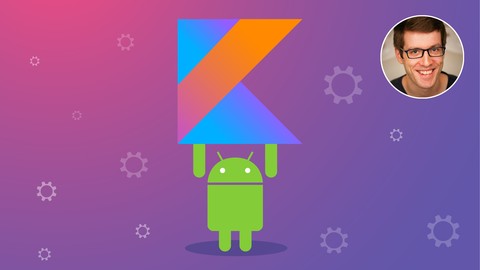
Kotlin for Android & Java Developers: Clean Code on Android
Kotlin for Android & Java Developers: Clean Code on Android, available at $84.99, has an average rating of 4.6, with 106 lectures, based on 1676 reviews, and has 8067 subscribers.
You will learn about Write clean code with Kotlin Avoid ceremony and boilerplate code around Android APIs Use functional programming to write concise, expressive code Create Android apps with Kotlin Write readable SQLite transactions using extension functions in Kotlin Use the Kotlin Android Extensions to avoid findViewById() Create multiple activities, layouts and menus This course is ideal for individuals who are Android developers or Java developers or Anyone with some programming experience who wants to learn Kotlin for Android It is particularly useful for Android developers or Java developers or Anyone with some programming experience who wants to learn Kotlin for Android.
Enroll now: Kotlin for Android & Java Developers: Clean Code on Android
Summary
Title: Kotlin for Android & Java Developers: Clean Code on Android
Price: $84.99
Average Rating: 4.6
Number of Lectures: 106
Number of Published Lectures: 105
Number of Curriculum Items: 106
Number of Published Curriculum Objects: 105
Original Price: $199.99
Quality Status: approved
Status: Live
What You Will Learn
- Write clean code with Kotlin
- Avoid ceremony and boilerplate code around Android APIs
- Use functional programming to write concise, expressive code
- Create Android apps with Kotlin
- Write readable SQLite transactions using extension functions in Kotlin
- Use the Kotlin Android Extensions to avoid findViewById()
- Create multiple activities, layouts and menus
Who Should Attend
- Android developers
- Java developers
- Anyone with some programming experience who wants to learn Kotlin for Android
Target Audiences
- Android developers
- Java developers
- Anyone with some programming experience who wants to learn Kotlin for Android
-
Learn to use Kotlin the right way to actually improveyour Android app code
-
Write null-safe, concise, and readable code in Kotlin using functional and object-oriented concepts
-
Work around unnecessary boilerplate code when using Android APIs (e.g. SQLite) using higher-order extension functions
-
Use Android Studio effectively to speed up your development workflow
-
Get your questions answered along the way should you ever get stuck
Why Take This Course?
I’ve been involved with Kotlin since late 2015, before it was released in its first stable version. As the instructor of the course “Kotlin for Beginners”, I know which topics students are interested in or get stuck with.
My first Kotlin course is recommended from the official Kotlin website and from the official Android website as a resource to learn Kotlin for Android. So you can be sure to get quality teaching here.
After this course, you’ll be able to confidently use Kotlin for any kind of project — but we’ll of course apply what we learn to Android app development in this course.
What Makes This Course Special?
Since Google’s #IO17 announcement to officially support Kotlin on Android, many new courses on the topic have been released — which is great because it further helps to spread the language.
What makes this course special is that while most other courses do not teach good coding style, this course will focus on producing clean code and teaches you to make use of Kotlin’s amazing features to actually write better code than in Java. This way, you will get a huge benefit using Kotlin instead of Java, e.g. by avoiding boilerplate code around many Android APIs.
What This Course Is NOT
This course is not an Android reference, I assume you already have at least some Android experience. Instead, you’ll learn to write cleaner code for your apps by applying Kotlin’s powerful language features to avoid unnecessary ceremony around Android APIs. Also, at the end of the course, you’ll be able to use Kotlin for any kind of project — not just for Android apps.
What Students Say About Me(taken from “Kotlin for Beginners”)
“TLDR; One of the best Kotlin course for beginners on Udemy! I took some time to write this review and wanted to finish the course THEN watch other courses offered here on Udemy and THEN want to see how good Peter was in teaching me basics of Kotlin so that I can apply the knowledge while writing actual android apps. And I am happy to report that it has helped me immensely. It wouldn’t be wrong if I say that the I was easily understanding the WHYs and WHATs even if the teacher wasn’t explaining in detail in other courses… Thank you Peter! You have taught me well! […]”
– Hasaan
“Great introduction to Kotlin and programming for beginner programmers!”
– Per-Erik
“Easy to follow, instructor goes at a great pace that’s friendly for beginners.”
– Ronaldo
“beyond excellent!!!!“
– Mike
“Great start so far. Looking forward to a great course. Best online course I have taken, by far!!“
– James
“Found this to be a very good course to get an overview of Kotlin. Everything was explained clearly and the examples and exercises were very helpful. I’m glad that Peter is considering a course for Android using Kotlin since I’m curious about that subject.”
– James
What You’ll Learn
-
How to set up all you needfor Android development using Kotlin (e.g. how to install Android Studio)
-
The basics of Kotlin: variables, null safety, immutability, conditionals, loops, functions, exception handling
-
Functional programming in Kotlin: higher-order functions, lambda expressions, lazy evaluation, lazy sequences, the Kotlin standard library
-
Object-oriented programming in Kotlin: all you know from Java + data classes, extension functions, smart casts, object declarations, differences from Java concerning inheritance
-
Android development with Kotlin: creating activities, layouts, menus, click listeners, working around unnecessarily complex Android APIs, improving SQLite transactions with extension functions, avoiding null in your code
——
What is Kotlin?
Kotlinis a modern language for the JVM, and the only officially supported language on Android beside Java. It’s developed by Jetbrains, the makers of IntelliJ on which Android Studio is based.
Since Google’s announcement to officially support Kotlin in 2017, interest in the language has radically increased — and with it the number of tutorials, courses, books, and also job offers for Kotlin. It’s a great time to dive into this modern language and get ahead of other Android developers!
With its modern language design that incorporates industry best practices, Kotlin allows you to write highly expressive, understandable and safe code — while being 100% interoperable with Java. You can use any Java classes and methods from Kotlin and the other way around.
This courses shows you what language features I mean, and how you can apply them in order to write world-class code.
Course Curriculum
Chapter 1: Introduction
Lecture 1: What You'll Learn in this Course
Lecture 2: Make the Most of this Course!
Lecture 3: Who's Using Kotlin?
Chapter 2: Get Ready
Lecture 1: Introduction
Lecture 2: Install the Java JDK 8
Lecture 3: Install Android Studio
Lecture 4: Set Up a Project in Android Studio
Lecture 5: Recap
Chapter 3: Kotlin Basics
Lecture 1: Introduction
Lecture 2: Variables and Data Types
Lecture 3: Null Safety in Kotlin
Lecture 4: Conditionals: "if" Expressions
Lecture 5: Conditionals: "when" Expressions
Lecture 6: Collections
Lecture 7: "for" Loops
Lecture 8: "while" Loops
Lecture 9: Functions
Lecture 10: Get Ready for Serious Kotlin Coding (Set up IntelliJ IDEA)
Lecture 11: Create a main() Function
Lecture 12: Challenge: Reading the User's Name from the Console
Lecture 13: Challenge: Using Collections and Loops
Lecture 14: Named Arguments & Default Parameter Values
Lecture 15: Exceptions
Lecture 16: Why No Checked Exceptions?
Lecture 17: Recap
Chapter 4: Functional Programming
Lecture 1: Introduction
Lecture 2: What is Functional Programming?
Lecture 3: Functional Programming II
Lecture 4: Lambdas & Higher-Order Functions
Lecture 5: Use map() and flatMap()
Lecture 6: Use take() and drop()
Lecture 7: Use zip()
Lecture 8: Challenge: Functional Programming for Data Analysis
Lecture 9: Chain Functions Together
Lecture 10: Lazy Sequences
Lecture 11: Case Study: Performance of Lazy Sequences
Lecture 12: Code Along: Infinite Lazy Sequence of All Prime Numbers
Lecture 13: Use "let" Operator for Scoping and Nullables
Lecture 14: Use "with" for Many Calls on the Same Object
Lecture 15: Use "use" for Closeable (like try-with-resources)
Lecture 16: Inline Functions
Lecture 17: Recap
Chapter 5: Object-Orientation in Kotlin
Lecture 1: Introduction
Lecture 2: Classes
Lecture 3: Properties with Getters & Setters
Lecture 4: Primary and Secondary Constructors
Lecture 5: Methods
Lecture 6: Extension Functions
Lecture 7: Data Classes
Lecture 8: Enums
Lecture 9: Inheritance
Lecture 10: Code Along: Inheritance Example
Lecture 11: Abstract Classes
Lecture 12: Interfaces
Lecture 13: Overriding Rules
Lecture 14: Smart Casts
Lecture 15: Visibilities
Lecture 16: Companion Objects for "Static" Members
Lecture 17: Object Declarations as Singletons
Lecture 18: Packages and Imports
Lecture 19: Generic Classes
Lecture 20: Generic Functions
Lecture 21: Covariance
Lecture 22: Covariance: Java vs Kotlin
Lecture 23: Covariance vs Contravariance: "out" and "in"
Lecture 24: Recap
Chapter 6: Kotlin for Android — Fundamentals
Lecture 1: Introduction
Lecture 2: Create the App Project
Lecture 3: Understand the Android Versions
Lecture 4: Create a CardView Layout and Add UI Elements
Lecture 5: Use the "Kotlin Android Extensions"
Lecture 6: Challenge: Set Texts and Image Source Programmatically
Lecture 7: Challenge Solution
Chapter 7: Kotlin for Android — Implement a RecyclerView
Lecture 1: Introduction
Lecture 2: What is a RecyclerView?
Lecture 3: Create the Data Class "Habit"
Lecture 4: Implement the "HabitsAdapter" – Part I
Lecture 5: Implement the "HabitsAdapter" – Part II
Lecture 6: Implement the "HabitsAdapter" – Part III
Chapter 8: Kotlin for Android — Let Users Create Habits
Lecture 1: Introduction
Lecture 2: Add a Menu
Lecture 3: Add a Second Activity
Lecture 4: Use Intents to Switch Activities
Lecture 5: Challenge: Build the Activity Layout
Lecture 6: Challenge Solution
Lecture 7: Let Users Choose an Image
Lecture 8: Get the Selected Image Back (onActivityResult)
Lecture 9: Show Error Messages to the User
Lecture 10: Code Along: An Extension Function for "EditText"
Chapter 9: Kotlin for Android — Use SQLite the Kotlin Way!
Lecture 1: Introduction
Lecture 2: Introducing SQLite
Instructors
-
Peter Sommerhoff
Developer & Software Engineer – With 45,000+ Happy Students
Rating Distribution
- 1 stars: 12 votes
- 2 stars: 22 votes
- 3 stars: 148 votes
- 4 stars: 616 votes
- 5 stars: 878 votes
Frequently Asked Questions
How long do I have access to the course materials?
You can view and review the lecture materials indefinitely, like an on-demand channel.
Can I take my courses with me wherever I go?
Definitely! If you have an internet connection, courses on Udemy are available on any device at any time. If you don’t have an internet connection, some instructors also let their students download course lectures. That’s up to the instructor though, so make sure you get on their good side!
You may also like
- Best Digital Illustration Courses to Learn in December 2024
- Best Renewable Energy Courses to Learn in December 2024
- Best Sustainable Living Courses to Learn in December 2024
- Best Ethical AI Courses to Learn in December 2024
- Best Cybersecurity Fundamentals Courses to Learn in December 2024
- Best Smart Home Technology Courses to Learn in December 2024
- Best Holistic Health Courses to Learn in December 2024
- Best Interior Design Courses to Learn in December 2024
- Best Nutrition And Diet Planning Courses to Learn in December 2024
- Best Yoga Instruction Courses to Learn in December 2024
- Best Stress Management Courses to Learn in December 2024
- Best Mindfulness Meditation Courses to Learn in December 2024
- Best Life Coaching Courses to Learn in December 2024
- Best Career Development Courses to Learn in December 2024
- Best Relationship Building Courses to Learn in December 2024
- Best Parenting Skills Courses to Learn in December 2024
- Best Home Improvement Courses to Learn in December 2024
- Best Gardening Courses to Learn in December 2024
- Best Sewing And Knitting Courses to Learn in December 2024
- Best Writing Courses Courses to Learn in December 2024





















